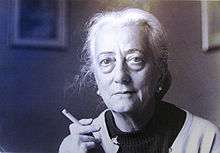Anna Murià
| Anna Murià | |
|---|---|
 | |
| Born |
21 May 1904 Barcelona, Spain |
| Died |
27 September 2002 (aged 98) Terrassa, Spain |
| Pen name | Romaní |
| Language | Spanish |
| Nationality | Spanish |
| Ethnicity | Catalan |
| Genre | translator, literary critic, and journalist |
| Literary movement | Grup Sindical d'Escriptors Catalans |
| Spouse | Agustí Bartra |
Anna Murià i Romaní (pseudonym, Romaní;[1] 21 May 1904 – 27 September 2002) was a Spanish narrator, translator, literary critic, and journalist of Catalan descent who wrote short stories, novels, children's literature, and essays.[2][3] A feminist activist, Murià i Romaní served as secretary of the Institució de les Lletres Catalanes, was a founding member of the Grup Sindical d'Escriptors Catalans (Union Group of Catalan Writers; 1936), and was an Honorary Member of the Associació d'Escriptors en Llengua Catalana.[4]
Early years
Born in Barcelona, Murià i Romaní was the daughter of the journalist and filmmaker, Magí Murià i Torner. She attended religious schools before studying commerce, accounting and English at the l'Institut de Cultura i Biblioteca de la Dona (1918–24).[4]
Career
Murià i Romaní was a relevant political female writer. She was involved with Acció Catalana, but joined Esquerra Republicana de Catalunya (Republican Left of Catalonia) in 1932, where she helped with the collection of signatures in favor of the adoption of the Statute of Autonomy of 1932 (es). In 1932, she organized the "Front Únic Femení Esquerrista" (United Front of Women from the Left) together with other relevant female activists and writers of the time such as Rosa Maria Arquimbau. In 1936, she joined the central committee of the Estat Català. Along with Ana María Martínez Sagi, Murià i Romaní was also a member of El Club Femení i d'Esports de Barcelona.[5]
During the Spanish Civil War, she was an official of the Generalitat of Catalonia, where she acted as secretary of the Institució de les Lletres Catalanes (Institute of Catalan Letters), collaborated in publications such La Dona Catalana, La Rambla, La Nau, Meridià and Diari de Catalunya. She was also a member of the Women's Union of Catalonia and a co-founder of the Grup Sindical d'Escriptors Catalans (Union Group of Catalan Writers).[4] While she wrote several novels, Aquest sera el principi ("This will be the Beginning"; 1986) is considered her major opus.[6]
Personal life
Murià i Romaní met her husband, the poet Agustí Bartra, in 1939, and they went into exile together. They had two children, a son, the anthropologist, Roger Bartra, and a daughter, the philosopher, Eli Bartra.[7] Before returning to Catalonia, Murià i Romaní and Bartra traveled through the Dominican Republic, Cuba and Mexico.[6] Muria i Romani died in Terrassa in 2002; she was a close friend of the writer, Mercè Rodoreda.
Selected works
- Joana Mas (1933)
- La peixera (1938)
- La revolució moral (1934)
- El 6 d'octubre i el 19 de juliol (1937)
- Via de l'est (1946)
- El nen blanc i el nen negre (1947)
- Crònica de la vida d'Agustí Bartra (1967)
- L'obra de Bartra (1975)
- El meravellós viatge de Nico Huehuetl a través de Mèxic (1974, Josep Maria Folch i Torres prize)
- A Becerola fan ballades (1978)
- Pinya de contes (1982)
- El país de les fonts (1980)
- El llibre d'Eli (1982)
- Res no és veritat, Alícia (1984)
- Cartes a l'Anna Murià (1985)
- Aquest serà el principi (1986)
- Quatre contes d'exili (2002)
- Reflexions de la vellesa (2003)
References
- ↑ Johnson, P. Louise (5 March 2004). "Working Paper AY0304 – 18, "Women Writing on Physical Culture in Pre – Civil War Catalonia"" (PDF). University of California, Berkeley. p. 3. Retrieved 10 April 2014.
- ↑ Ibarz, Mercè. "Literature as a moral vice". Retrieved 5 April 2014.
- ↑ Abrams, D. Sam. "Anna Murià". Universitat Oberta de Catalunya. Retrieved 6 April 2014.
- 1 2 3 "Anna Murià". Escriptors Catalana. Retrieved 5 April 2014.
- ↑ Bergmann, Emilie L.; Herr, Richard (2007). Mirrors and Echoes: Women's Writing in Twentieth-century Spain. University of California Press. pp. 33–. ISBN 978-0-520-25267-7.
- 1 2 Bleiberg, Germán; Ihrie, Maureen; Pérez, Janet (1 January 1993). Dictionary of the Literature of the Iberian Peninsula. Greenwood Publishing Group. pp. 1147–. ISBN 978-0-313-28732-9.
- ↑ Gámez, Silvia Isabel (28 November 2013). "Bartra y Murià, un 'amor sin fisuras'". Retrieved 5 April 2014.
|